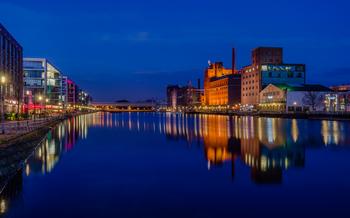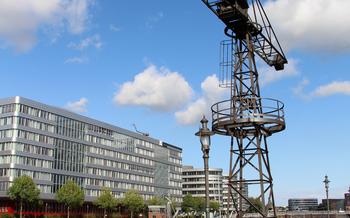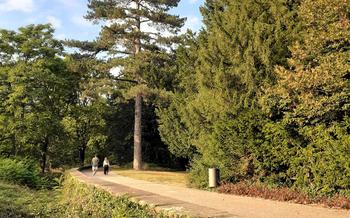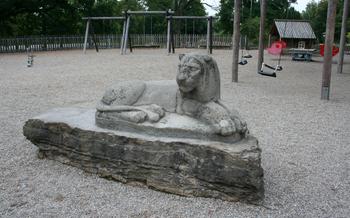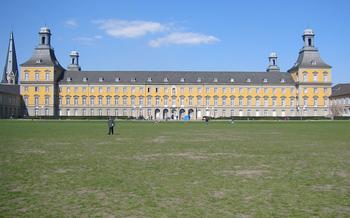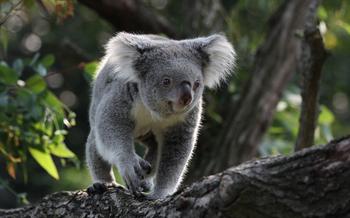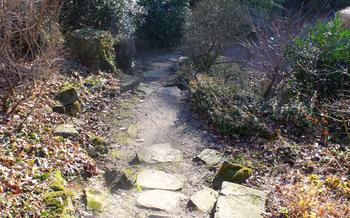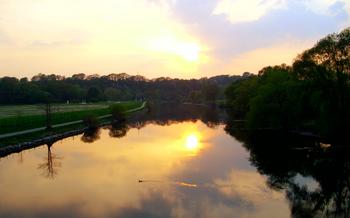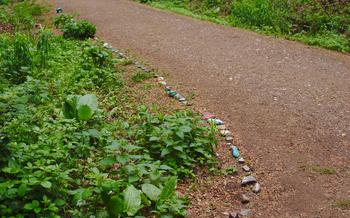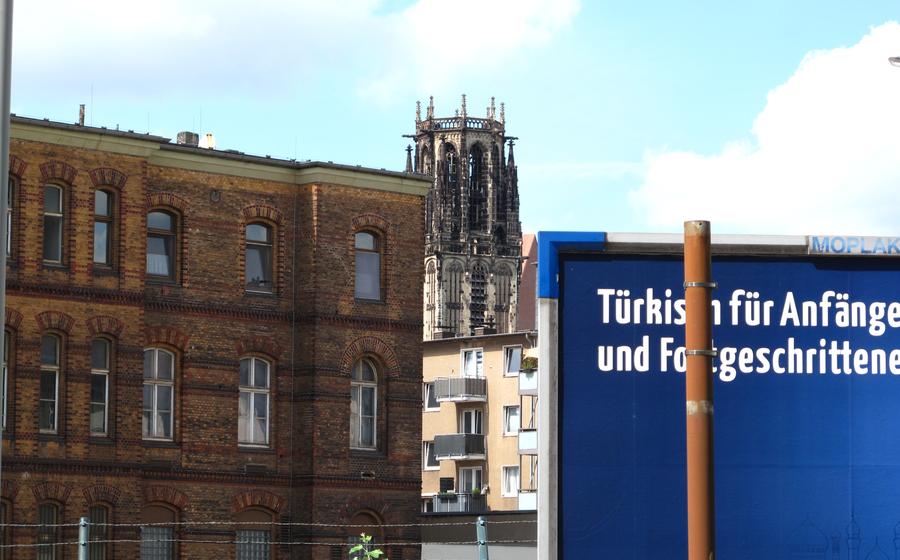
Kaisergarten Park and Zoo
- Duisburg Zoo: A Journey into the Animal Kingdom
- Highlights of Kaisergarten Park
- Highlights of Duisburg Zoo
- Things to Do in Kaisergarten Park
- Things to Do in Duisburg Zoo
- Practical Tips for Visiting Kaisergarten Park
- Practical Tips for Visiting Duisburg Zoo
- Purchase tickets online in advance to avoid queues.
- Arrive early to make the most of your visit.
- Dress appropriately for the weather.
- Follow the zoo's safety guidelines.
- History of Kaisergarten Park
- History of Duisburg Zoo
- Kaisergarten Park's Contribution to the Community
- Duisburg Zoo's Contribution to the Community
- Interesting facts about Kaisergarten Park
- Interesting facts about Duisburg Zoo
- Insider Tip
Duisburg Zoo: A Journey into the Animal Kingdom
History and Background: Duisburg Zoo, nestled in the heart of Duisburg, Germany, traces its roots back to 1934 when it was established as a small wildlife park. Over the years, the zoo has undergone significant expansion and transformation, evolving into a world-class institution dedicated to animal conservation, education, and entertainment.
Location and How to Get There: Conveniently situated in the city center, Duisburg Zoo is easily accessible by public transportation. Visitors can take advantage of the nearby tram and bus stops, ensuring a hassle-free journey to the zoo's entrance. For those arriving by car, ample parking is available on-site, providing a convenient starting point for their zoo adventure.
Opening Hours and Admission Fees: Duisburg Zoo welcomes visitors throughout the year, offering varying opening hours depending on the season. During the summer months, the zoo extends its hours to accommodate the longer daylight, allowing guests to fully immerse themselves in the animal kingdom. Admission fees are structured to provide affordable access for individuals and families, encouraging everyone to experience the wonders of the zoo.
Animals and Attractions: Duisburg Zoo boasts an impressive collection of over 1,000 animals representing approximately 250 species from around the globe. Visitors are taken on a captivating journey through diverse habitats, encountering majestic elephants, playful penguins, graceful giraffes, and a multitude of other fascinating creatures. The zoo's commitment to animal welfare and conservation shines through in its state-of-the-art enclosures, designed to replicate the animals' natural environments.
Highlights of Kaisergarten Park
The Kaisergarten Park boasts several captivating highlights that draw visitors from far and wide. One of its most beloved attractions is the Rosarium, a magnificent rose garden that features over 5,000 roses in an array of colors and varieties. The meticulously arranged roses create a breathtaking display, making it a haven for nature enthusiasts and photographers.
Another highlight is the Japanese Garden, a serene oasis that transports visitors to the tranquility of the Far East. The traditional landscaping, with its winding paths, ornamental ponds, and meticulously pruned plants, offers a tranquil retreat amidst the bustling city.
Art enthusiasts will delight in the Sculpture Garden, which showcases a diverse collection of contemporary and classical sculptures by renowned artists from around the world. The sculptures are integrated seamlessly into the park's natural surroundings, creating an enchanting outdoor gallery.
Finally, the Swan Pond is a charming spot where visitors can observe graceful swans and ducks gliding across the tranquil waters. The pond's serene atmosphere and the surrounding greenery create an idyllic setting for relaxation and contemplation.
Highlights of Duisburg Zoo
Duisburg Zoo is home to a wide range of animals from around the world, including some fascinating and endangered species. One of the highlights of the zoo is the Giant Panda Enclosure, where visitors can observe these adorable creatures in their specially designed habitat. The zoo is also home to majestic elephants, which can be seen up close in the Elephant House. Visitors can also encounter orangutans, gorillas, and chimpanzees in the Great Ape House, where they can learn about these intelligent and endangered primates. Additionally, the Aquarium and Terrarium offer a glimpse into the underwater world and the fascinating world of reptiles, amphibians, and invertebrates.
Things to Do in Kaisergarten Park
Kaisergarten Park offers a range of activities for visitors of all ages to enjoy. Take a leisurely stroll through the park's enchanting gardens, admiring the colorful blooms and fragrant scents. Discover the intricate sculptures and monuments that adorn the park, adding a touch of artistic charm to the natural beauty. Relax by the peaceful ponds and watch the wildlife, including graceful swans and ducks, as they glide across the water. For a fun and memorable experience, pack a picnic or fire up a BBQ in the designated areas, savoring a delicious meal amidst the tranquil surroundings.
Things to Do in Duisburg Zoo
Duisburg Zoo offers a range of activities and experiences for visitors of all ages. Take your time to wander through the zoo's spacious enclosures and observe the animals in their natural habitats. Learn about wildlife conservation and the zoo's breeding programs through educational programs and workshops. Attend exciting animal shows and demonstrations that showcase the animals' intelligence and skills. Make sure to grab a bite to eat or enjoy a refreshing snack at one of the zoo's restaurants or cafes while taking a break from your exploration.
Practical Tips for Visiting Kaisergarten Park
To make the most of your visit to Kaisergarten Park, it is advisable to plan ahead and come prepared. Here are some practical tips to ensure a smooth and enjoyable experience:
-
Comfortable Footwear: Kaisergarten Park is vast, with plenty of walking paths and trails to explore. Wear comfortable shoes that are suitable for walking on uneven surfaces and long distances.
-
Hydration and Snacks: While the park offers limited food options, it is recommended to bring your own water and snacks to stay hydrated and energized throughout your visit.
-
Camera: The park's beauty and scenic spots are perfect for capturing memorable moments. Bring your camera or smartphone to capture the stunning gardens, sculptures, and wildlife.
-
Park Rules and Regulations: Respect the park's rules and regulations to ensure a safe and pleasant experience for all visitors. These rules may include restrictions on activities like cycling, dog walking, and littering.
Practical Tips for Visiting Duisburg Zoo
Purchase tickets online in advance to avoid queues.
Avoid the hassle of waiting in long lines at the zoo entrance by purchasing your tickets online in advance. This option is usually available on the zoo's official website, where you can select your desired date and time of visit. Online ticketing often offers discounted rates and allows you to bypass the queues, ensuring a smooth and convenient entry into the zoo.
Arrive early to make the most of your visit.
The Duisburg Zoo is a vast and diverse attraction, housing a wide variety of animals and exhibits. To make the most of your visit, it is advisable to arrive early in the morning. This allows you ample time to explore the zoo at your own pace, observe the animals during their most active periods, and participate in any scheduled events or shows. Arriving early also helps you avoid the crowds that tend to gather later in the day.
Dress appropriately for the weather.
Duisburg's climate can be unpredictable, with varying temperatures and occasional precipitation. To ensure a comfortable and enjoyable visit, dress appropriately for the weather conditions. During the summer months, light and breathable clothing is recommended, along with sunscreen and a hat to protect yourself from the sun. In colder months, wear warm and waterproof clothing to stay comfortable while exploring the outdoor exhibits.
Follow the zoo's safety guidelines.
For the safety of both visitors and animals, the Duisburg Zoo has implemented a set of safety guidelines that must be followed. These guidelines include staying on designated paths, maintaining a safe distance from the animal enclosures, and refraining from feeding or disturbing the animals. It is important to adhere to these rules to ensure a safe and enjoyable experience for everyone.
History of Kaisergarten Park
The origins of Kaisergarten Park can be traced back to the early 1900s when the city of Duisburg sought to create a green oasis for its residents. The park's design was entrusted to renowned landscape architect Walter Funcke, who envisioned a harmonious blend of natural beauty and artistic elements. Funcke's plan incorporated flower gardens, tree-lined walkways, ponds, and sculptures, creating a picturesque landscape that would become a beloved destination for locals and visitors alike.
The park's construction began in 1912 and was completed in stages over the next few years. However, its existence was tragically cut short by the outbreak of World War II when bombs rained down on Duisburg, leaving the park in ruins. The destruction was so extensive that it seemed like the park would never be restored to its former glory.
Fortunately, in the aftermath of the war, a group of dedicated citizens came together to rebuild the Kaisergarten Park. With unwavering determination and meticulous care, they replanted trees, restored the gardens, and painstakingly reconstructed the damaged sculptures. Through their tireless efforts, the park was gradually brought back to life, becoming a symbol of resilience and the power of community spirit.
History of Duisburg Zoo
Duisburg Zoo, a prominent attraction in the city of Duisburg, was established in 193It has a rich history marked by growth, expansion, and significant contributions to the world of conservation. Initially founded as a small animal park, the zoo has undergone remarkable transformations over the years, evolving into a renowned institution dedicated to animal welfare, education, and research.
The zoo's humble beginnings can be traced back to a modest collection of animals housed in the city's Botanical Garden. As its popularity grew, the need for a larger and more suitable space became evident. In 1934, the decision was made to establish a dedicated zoological garden in Duisburg. The zoo's early years were marked by challenges, including the impact of World War II, which caused significant damage to the facilities. However, the zoo's dedicated staff worked tirelessly to rebuild and restore the animal collection.
In the postwar era, Duisburg Zoo embarked on a period of significant expansion and development. New enclosures were constructed, the animal collection was diversified, and educational programs were introduced. The zoo's commitment to animal welfare and conservation became a central focus, leading to the establishment of breeding programs for endangered species.
Today, Duisburg Zoo stands as one of the largest and most respected zoos in Germany. It houses over 1,000 animals representing 250 species from around the world. The zoo's modern facilities, educational exhibits, and interactive experiences provide visitors with an unforgettable and enriching encounter with the animal kingdom.
Kaisergarten Park's Contribution to the Community
Kaisergarten Park plays a vital role in enhancing the quality of life for residents and visitors in Duisburg. It offers a tranquil green space where people can escape the hustle and bustle of city life and immerse themselves in nature. The park provides a sanctuary for relaxation, recreation, and rejuvenation. It hosts a variety of cultural events and festivals throughout the year, bringing the community together and fostering a sense of belonging.
Kaisergarten Park also serves as an educational resource for schools and groups. It offers guided tours that highlight the park's history, horticulture, and wildlife. Schoolchildren can learn about the importance of conservation and environmental stewardship through interactive programs and workshops. The park's diverse plant and animal species provide valuable opportunities for students to observe and study nature firsthand.
Furthermore, Kaisergarten Park contributes to Duisburg's tourism industry. It attracts visitors from near and far who come to admire its beauty and enjoy its amenities. The park's reputation as a well-maintained and welcoming green space has made it a popular destination for tourists and locals alike. By attracting visitors, the park generates revenue and supports local businesses, contributing to the city's economy.
Duisburg Zoo's Contribution to the Community
Duisburg Zoo plays a vital role in the community, extending its influence beyond the realm of entertainment and recreation. It serves as an educational hub, offering a variety of programs and workshops tailored to different age groups. These programs aim to instill a sense of respect and appreciation for wildlife, while fostering a deeper understanding of the natural world and its delicate balance.
The zoo's commitment to conservation and research is equally commendable. It actively participates in various breeding programs for endangered species, contributing to the preservation of genetic diversity and the fight against extinction. Through collaborations with other zoos and organizations worldwide, Duisburg Zoo shares expertise, resources, and knowledge, working collectively to safeguard the future of threatened species.
Furthermore, the zoo promotes animal welfare and responsible tourism. It adheres to the highest standards of animal care, ensuring that all inhabitants receive proper nutrition, veterinary attention, and a stimulating environment that mimics their natural habitats. By educating visitors about responsible tourism practices, the zoo encourages ethical interactions with wildlife, both within the zoo and beyond.
In essence, Duisburg Zoo transcends its role as a mere tourist attraction. It serves as a catalyst for conservation, education, and responsible tourism, contributing significantly to the well-being of both animals and the community it serves.
Interesting facts about Kaisergarten Park
Beyond its rich history and captivating attractions, Kaisergarten Park boasts a treasure trove of intriguing facts that add to its charm and significance.
-
Diverse Flora: The park is home to an impressive collection of over 400 plant species, including colorful flowers, majestic trees, and fragrant shrubs. This diversity creates a vibrant tapestry of colors and textures, making each visit a unique sensory experience.
-
Historical Water Tower: Amidst the lush greenery stands a historical water tower that has become an iconic landmark of the park. Constructed in the early 1900s, the tower offers visitors panoramic views of the park and the surrounding cityscape, providing a bird's-eye perspective of Duisburg's beauty.
-
Popular Wedding Venue: Kaisergarten Park's enchanting ambiance and picturesque landscapes make it a sought-after wedding venue. Many couples choose to exchange vows amidst the park's blooming rose gardens or under the shade of its ancient trees, creating unforgettable memories that will last a lifetime.
-
Squirrel Colony: The park is home to a thriving colony of squirrels that delights visitors with their playful antics and acrobatic skills. These furry creatures can be spotted scampering through the trees, chasing each other, and occasionally interacting with park guests, adding a touch of whimsy and charm to the park's atmosphere.
Interesting facts about Duisburg Zoo
-
Duisburg Zoo is one of the largest zoos in Germany, spanning over 12 hectares (30 acres) and housing over 1,000 animals representing approximately 250 species. Its diverse collection includes majestic elephants, adorable giant pandas, playful penguins, fascinating reptiles, and a variety of primates, including orangutans, gorillas, and chimpanzees.
-
The zoo is renowned for its successful breeding program for endangered species. Through its dedication to conservation and responsible breeding practices, Duisburg Zoo has played a crucial role in preserving and increasing the populations of threatened species, contributing to global efforts to protect biodiversity.
-
Duisburg Zoo is actively involved in various conservation initiatives worldwide. Beyond its breeding programs, the zoo collaborates with other zoos, organizations, and conservationists around the world to support conservation projects, protect habitats, and promote sustainable practices. This commitment to conservation extends beyond the zoo's walls, making a positive impact on wildlife and ecosystems on a global scale.
-
The zoo's dedication to animal welfare is evident in its high standards of care and enrichment programs. Duisburg Zoo provides its animals with spacious and stimulating habitats that mimic their natural environments, allowing them to express their natural behaviors and live healthy, fulfilling lives. The zoo's commitment to animal welfare ensures that the animals receive the best possible care and attention, promoting their physical and mental well-being.
Insider Tip
To make your visit to Kaisergarten Park even more memorable, plan your trip during the annual "Lichterfest" (Festival of Lights) held in September. This enchanting event transforms the park into a magical wonderland with thousands of colorful lights illuminating the gardens, ponds, and sculptures. As you stroll through the park, you'll be mesmerized by the breathtaking displays of light and shadow that create a truly unforgettable experience.
For a unique perspective of the park and the city, take a ride on the Kaiserbergbahn cable car. This scenic journey offers stunning panoramic views of the Kaisergarten Park, the Ruhr River, and the surrounding cityscape. The cable car ride is a great way to appreciate the park's beauty from a different angle and capture some Insta-worthy photos.
